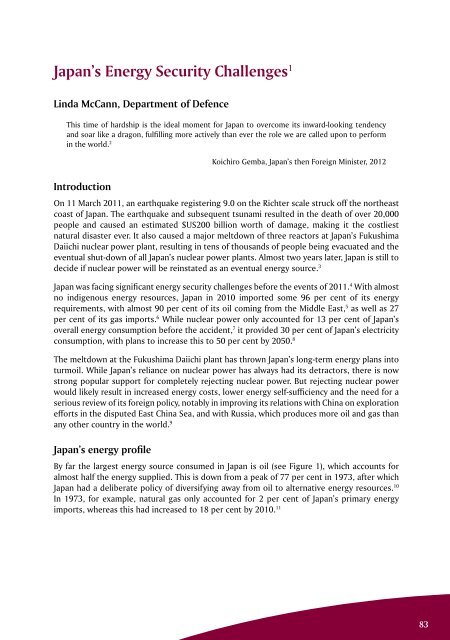190%202013%20Mar_Apr
190%202013%20Mar_Apr
190%202013%20Mar_Apr
You also want an ePaper? Increase the reach of your titles
YUMPU automatically turns print PDFs into web optimized ePapers that Google loves.
Japan’s Energy Security Challenges 1<br />
Linda McCann, Department of Defence<br />
This time of hardship is the ideal moment for Japan to overcome its inward-looking tendency<br />
and soar like a dragon, fulfilling more actively than ever the role we are called upon to perform<br />
in the world. 2<br />
Introduction<br />
Koichiro Gemba, Japan’s then Foreign Minister, 2012<br />
On 11 March 2011, an earthquake registering 9.0 on the Richter scale struck off the northeast<br />
coast of Japan. The earthquake and subsequent tsunami resulted in the death of over 20,000<br />
people and caused an estimated $US200 billion worth of damage, making it the costliest<br />
natural disaster ever. It also caused a major meltdown of three reactors at Japan’s Fukushima<br />
Daiichi nuclear power plant, resulting in tens of thousands of people being evacuated and the<br />
eventual shut-down of all Japan’s nuclear power plants. Almost two years later, Japan is still to<br />
decide if nuclear power will be reinstated as an eventual energy source. 3<br />
Japan was facing significant energy security challenges before the events of 2011. 4 With almost<br />
no indigenous energy resources, Japan in 2010 imported some 96 per cent of its energy<br />
requirements, with almost 90 per cent of its oil coming from the Middle East, 5 as well as 27<br />
per cent of its gas imports. 6 While nuclear power only accounted for 13 per cent of Japan’s<br />
overall energy consumption before the accident, 7 it provided 30 per cent of Japan’s electricity<br />
consumption, with plans to increase this to 50 per cent by 2050. 8<br />
The meltdown at the Fukushima Daiichi plant has thrown Japan’s long-term energy plans into<br />
turmoil. While Japan’s reliance on nuclear power has always had its detractors, there is now<br />
strong popular support for completely rejecting nuclear power. But rejecting nuclear power<br />
would likely result in increased energy costs, lower energy self-sufficiency and the need for a<br />
serious review of its foreign policy, notably in improving its relations with China on exploration<br />
efforts in the disputed East China Sea, and with Russia, which produces more oil and gas than<br />
any other country in the world. 9<br />
Japan’s energy profile<br />
By far the largest energy source consumed in Japan is oil (see Figure 1), which accounts for<br />
almost half the energy supplied. This is down from a peak of 77 per cent in 1973, after which<br />
Japan had a deliberate policy of diversifying away from oil to alternative energy resources. 10<br />
In 1973, for example, natural gas only accounted for 2 per cent of Japan’s primary energy<br />
imports, whereas this had increased to 18 per cent by 2010. 11<br />
83


